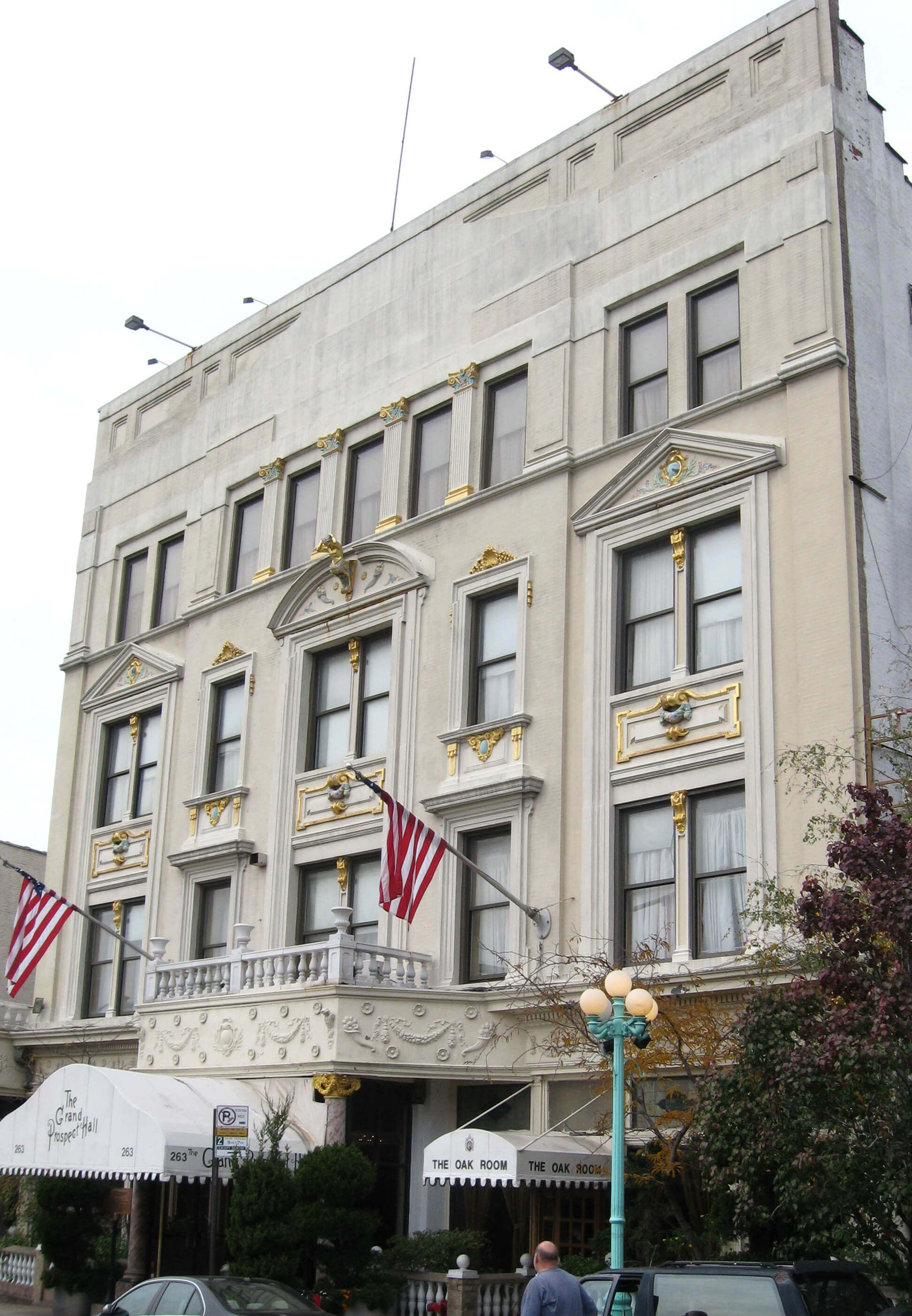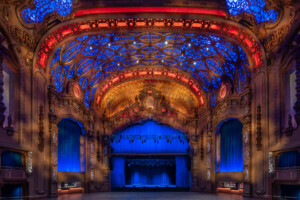A last-ditch effort to spare Park Slope, Brooklyn’s Grand Prospect Hall from the wrecking ball by having the beloved banquet facility designated a city landmark was rejected earlier this week by New York City’s Landmarks Preservation Commission (LPC).
Valued at $22.5 million, the 118-year-old building was sold in a $30 million deal to Brooklyn-based electrical contractor Angelo Rigas, under the LLC Gowanus Cubes, in mid-July as part of a 12-parcel assemblage flanking Prospect Avenue. As first reported by the Brooklyn Paper, Rigas filed for a demolition permit for the property in late August, sparking the formation of an impassioned coalition of neighborhood activists and others to save the building, which has been shuttered to the public since the onset of the COVID-19 pandemic. In May 2020, Michael Halkias, who had owned the building and operated it alongside his wife Alice as a “distinctly elegant yet affordable” wedding and event venue (and occasional filming location) for nearly 40 years, succumbed to COVID.
In a September 14 letter, Kate Lemos McHale, director of research at the LPC, outlined why the building, which was added to the National Register of Historic Places in 1999 but lacks crucial city landmark status, had been denied.

“Because of alterations to the exterior and interior of the building, it does not have sufficient historic integrity for consideration as a landmark,” the letter, which was shared by Save the Grand Prospect Hall campaign on social media as well as by local media outlets including Gothamist, reads in part. McHale went on to note that substantial alternations to the building carried out over the years, including the removal of its original pedimented cornice, “diminish the legibility of the original design and substantially impact the historic architectural character and integrity of the building.”
“LPC does not regulate use, and landmark designation does not compel an owner to restore a building or bring back a prior use,” McHale added.
The letter was addressed to 18-year-old campaigner Toby Panone, who alongside his friend, 16-year-old Solya Spiegel, are among those leading the charge to save the building. As noted in a recent op-ed, Panone and Spiegel are both members of the Zlatne Uste Golden Festival community, the annual Balkan music event held at Grand Prospect Hall up until its closure.
Some unfortunate news: @nyclandmarks has denied our request. Nonetheless, we plan to keep working to try and save the facade by halting work or discussing with the developer ways to preserve the facade. We will update you soon.
You can read the full letter below: pic.twitter.com/t0MNjlaNK1
— Save The Grand Prospect Hall (@savethegph) September 14, 2021
Built as Prospect Hall and later renamed, the four-story, French Renaissance-style building is an early work of Ulrich Huberty, a noted New York City architect, who together with McKim, Mead & White protégé Frank J. Helmle, designed a number of Brooklyn landmarks including the Prospect Park Boathouse, Hotel Bossert, and Greenpoint Savings Bank during the early 20 century. Erected as a social hub and vaudeville venue by German-born entrepreneur John Kolle, the current building was constructed on the site of the first Prospect Hall, also owned by Kolle, a wildly popular amusement hall that burnt to the ground in 1900. In 1940 the building was sold and converted into a Polish-American community center. Although in near-constant use through the decades, by the 1970s Prospect Hall had fallen into a state of disrepair. In 1981, Michael and Alice Halkias purchased the building and the Grand Prospect Hall was born.
Grand Prospect Hall, which was lovingly revamped in ornate Victorian style by the Halkiases over the years, became famous (or at least regionally famous) beginning in the mid-1980s thanks to low-budget, high-enthusiasm adverts that were a late-night television mainstay in New York. “We make your dreams come true!” promise-shouted a thickly accented Alice Halkias in an enduring (and effective, apparently) pitch line featured in the final version of the commercial, which was released in 2009. In 2019, the 2009 commercial (only two were ever filmed, the first in 1986) reached the pinnacle of Big Apple pop culture ubiquity when Saturday Night Live aired a Grand Prospect Hall spoof; also that year, the Halkiases, along with Pete Alonso of the New York Mets, appeared in a tongue-cheek send-up that aired on a taped-in-Brooklyn episode of Jimmy Kimmel Live!
True, Grand Prospect Hall’s kitschy, Vivaldi-scored 2009 commercial was cheesy, cheap, and aired incessantly. The rococo interiors of the space itself were very much an acquired taste but this singular Brooklyn institution was nothing less than adored. For many, attending an event at Grand Prospect Hall was something of a distinctly Brooklyn cultural rite of passage, and based on the massive outpouring behind the effort to save the building, plenty of people have stepped inside the catering hall for weddings, bar and bat mitzvahs, festivals, conferences, concerts, conventions, and even high school proms. In 2017, Grand Prospect Hall achieved infinite hipster cred when the Arcade Fire hosted an album release concert in the legendary—and legendarily over-the-top—grand ballroom.
“Suddenly faced with the loss of Grand Prospect Hall, we have scrambled to raise awareness and take action to save what remains of this beloved Brooklyn monument,” wrote Spiegel, along with Jim Glaser of nonprofit arts collective the Kostume Kult, in a September 13 op-ed published by the Brooklyn Eagle. “Considering the critical importance of New York’s cultural sector as we emerge from the pandemic, we must do all we can to prevent GPH’s destruction and that of other important institutions that may befall the same fate.”
As reported by Gothamist yesterday, the campaigners are now directly appealing to Rigas via his attorneys to reach a compromise in which the building’s facade is preserved. They’ve also reportedly reached out to Mayor Bill de Blasio for help but have not received a response. An emergency court order temporarily halting demolition work that went into effect earlier this month is set to expire on Monday.
“We’re not going to stop — we’ll keep writing people, calling the mayor, calling offices, we’ll keep putting up posters,” Spiegel told the Brooklyn Paper earlier this week. “We’ll do whatever we can do get anyone to notice.”











